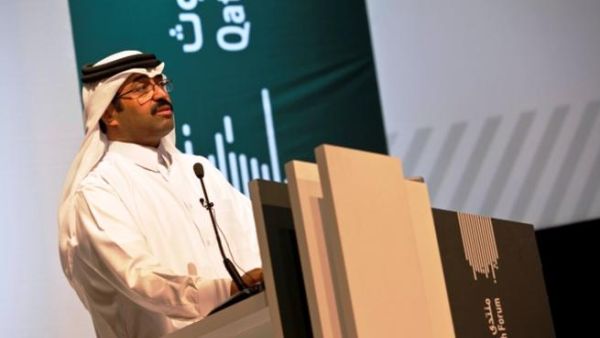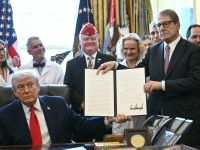Minister of Energy and Industry: Research critical to Qatar’s leadership in energy

Qatar’s oil and gas industry will remain strong after 2030, but will build on the knowledge economy through energy research, Qatar’s Minister of Energy and Industry, H.E. Dr. Mohammed Bin Saleh Al-Sada, said on day two of Qatar Foundation’s Second Annual Research Forum.
“As Qatar develops and diversifies its economy, the oil and gas industry will still be a significant business for Qatar by 2030,” said HE Dr. Al-Sada, “The biggest challenge the oil and gas business will be facing in the future is the need for more knowledge-based development and new technology.”
Minister Al-Sada’s speech today reflected an increased focus on energy and environment research at the Annual Research Forum, where students and scientists presented projects on alternative energy solutions, water desalination and reduction of carbon dioxide emissions.
Focusing on research as a critical component to the continued development of Qatar’s oil and gas industries, the minister commended Qatar Foundation’s role in developing the country’s human capital. “This can only be achieved and maintained through continuous development of new knowledge and progressive research,” commented Dr. Al-Sada.
“The strong commitment that Qatar Foundation has attributed to education and research is a driving force for the future development of our nation. This commitment is translated into the creation of an impressive undertaking in the unique infrastructure and community formed by the Hamad Bin Khalifa University and Qatar Science & Technology Park.”
Commenting on the importance of the Annual Research Forum, HE said: “Progress in science and research is always driven by peer discussions, the exchange of ideas, and research collaboration. The forum provides an opportunity for academics to interact with industry by presenting the latest developments in innovative research.”
Minister Al-Sada acknowledged that Qatar’s research capacity and capabilities are still in the early development stages, and will continue to be so “for some years to come.” On the secret to success for Qatar’s research ramp-up, Minister Al-Sada added, “It will not be enough to concentrate only on what needs to be done, but also on how we do it.”
In closing, Minister Al-Sada emphasized the importance of continuing joint efforts towards sustainable growth. “Only then will we leave a legacy of prosperity and development that our future generations can be truly proud of.”
Following Minister Al-Sada’s keynote address, researchers from organizations and institutions across Qatar presented their projects to the assembled regional and international scientists, academics and industry leaders. Many of the projects - which amounted to 47 projects in energy and 39 in environment - were the result of collaboration with a range of top international institutions including the University of Kentucky, University of Singapore, University of Houston, Michigan State University, Beijing Jiaotong University, and the U.S. campus of the Texas A&M University.
Haider Ramadhan, a senior at Texas A&M University at Qatar, presented a poster on his research at the Forum and described how Shell, Rolls-Royce, the University of Sheffield (UK) and the Qatar Science & Technology Park (QSTP) had partnered in various aspects of his research on the development of synthetic GTL-based jet fuels, aimed at reducing carbon dioxide emissions.
Another research endeavor presented at the exhibition explored the possibility of converting waste cooking oil into biofuel. The project was a joint collaboration between QSTP and India’s TATA Consulting Engineers Limited.
Sponsors of this year’s forum include ExxonMobil, Shell, Total, Chevron and Carnegie Mellon University in Qatar.
Background Information
Qatar Foundation
Qatar Foundation (QF) is a non-profit organization made up of more than 50 entities working in education, research, and community development.
Our unique ecosystem—supported by partnerships with leading international institutions—is built on initiatives that address our most pressing challenges, create global opportunities, and empower people to shape our present and future.






